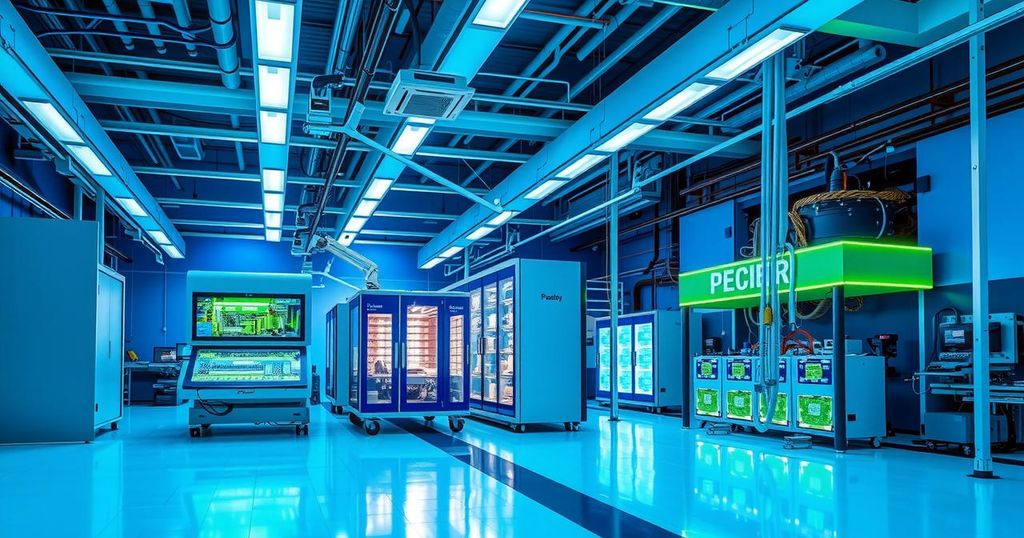Weekly News Roundup: China, Samsung, and TSMC Highlight Tech Shifts
This week’s key stories include China’s advancements in DUV lithography, Samsung securing an order from Nintendo, TSMC’s plans for extensive fab expansion, and Europe contemplating a ban on Chinese solar inverters. The week reflects shifting dynamics in the tech and semiconductor industries, highlighting competition and geopolitical tensions.
In this week’s news roundup, we examine significant developments happening in the semiconductor sector and broader tech landscape. China is advancing its domestically produced DUV lithography equipment, while Samsung receives vital orders from Nintendo. Additionally, TSMC is poised to expand its global footprint significantly, even as European regulators contemplate a ban on Chinese-made solar inverters due to security concerns.
China’s progress in DUV lithography, amidst U.S. export restrictions, is notable. The country plans to introduce a 193nm dry ArF system featuring 65nm resolution and 8nm overlay accuracy, expected by September 2024. However, these advancements still lag behind global standards. Research into immersion DUV technology is spearheaded by the Chinese Academy of Sciences and Beijing RSLaser. While SMEE has reportedly developed a 28nm immersion prototype, its readiness for mass production remains uncertain.
On another front, Samsung Electronics scored a crucial foundry contract with Nintendo for its Switch 2, projected to ship 15 million units by fiscal 2025. This deal paves the way for future collaborations with major players like Nvidia and Qualcomm, who are investigating Samsung’s promising 2nm GAA process. Currently, Samsung’s yields for this advanced manufacturing process range from 40 to 50%, with an aim of reaching 60% for large-scale production.
In terms of market dynamics, China’s Integrated Device Manufacturers (IDMs) are gaining traction while Europe appears to be losing its competitive edge. The global power semiconductor market saw a downturn to US$32.3 billion in 2024, yet Silan and BYD rose to sixth and seventh positions in market share. With domestic chip self-sufficiency below 15%, China aims to achieve a 25% target by 2025, fueled by government support and rising investments in SiC and IGBT technologies.
Moving forward, TSMC has revealed significant expansion plans for 2025, which include the construction of eight new wafer fabs and an advanced packaging plant. This strategic step is designed to cater to skyrocketing AI and High-Performance Computing (HPC) demands. Furthermore, TSMC’s 2nm fabs in Taiwan are scheduled to commence production soon, targeting fulfillment of anticipated growth in AI chip shipments.
In a new partnership, MediaTek and Nvidia are set to unveil a collaborative AI PC platform by 2025. The project includes advanced offerings like chips poised for Nvidia’s ambitious Project Digits. Grounded in technologies spanning edge AI and smart transportation, this alliance is backed by major names like Dell and Lenovo. However, a growing talent drain from MediaTek to Nvidia casts a shadow over the collaboration.
In business developments, TSMC is selling equipment worth approximately US$71 million to VisionPower Semiconductor Manufacturing Company (VSMC) for a new fab in Singapore, which aims for mass production by 2027. This comes alongside TSMC’s impressive first-quarter revenue figures, further establishing it as a financial powerhouse in semiconductors.
Lastly, European regulators are considering a ban on Chinese solar inverters due to cybersecurity threats, particularly focusing on products from Huawei and Sungrow. With a substantial portion of inverters sourced from China, the potential disruption risks have raised concerns about grid reliability. Critics warn that such a prohibition might elevate project costs significantly. The European Solar Manufacturing Council has proposed new security measures to mitigate these vulnerabilities, but the final decision remains under review by the EU Commission.
This week’s developments highlight a transformative phase in the global technology landscape. China continues its push towards semiconductor self-sufficiency, while Samsung’s recovery and TSMC’s expansion signal evolving industry dynamics. Concurrently, Europe’s contemplation on banning Chinese solar inverters due to cybersecurity issues underscores the precarious interplay between technology, politics, and international trade. As these trends unfold, attention will be drawn to how these shifts influence global markets and competitive relations.
Original Source: www.digitimes.com




Post Comment